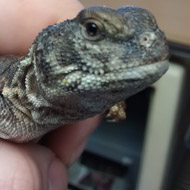
RSPCA warns of rise in exotic pets
A desert lizard has been taken in by the RSPCA after it was found wandering around a park in Surrey.
The stray Uromastyx, also referred to as a 'spiny-tailed lizard', 'dabb lizard' or 'uro', is native to arid desert regions. However, this one was found in Blagdon Park in New Maldon.
RSPCA inspector and exotics officer Anthony Pulfer said: “It was a real surprise to find the caller had found a uromastyx lizard as these animals aren’t one of the more common lizards kept as pets.
“Uromastyx come from very warm and dry areas in the wild and therefore need to be kept in a warm and dry environment as appropriate for the particular species if kept in captivity, so the fact this lizard was in a damp and cold park is very worrying. Luckily it’s doing very well."
The animal charity say that they are experiencing a rise in the number of reptiles coming in to thier care.
In 2014, the RSPCA collected almost 2,000 reptiles as a result of cruelty, abandonment and neglect.
Anthony added: "Sadly the RSPCA is experiencing widespread neglect and abandonment of reptiles as for many people an exotic animal represents too much of a commitment.
"We would encourage people who are thinking about taking on an exotic pet to research the needs of the species thoroughly and ensure they can meet them at all times. Caring for a reptile can be difficult and expensive; the animal may grow very large, live for a long time, become aggressive or require a licence or paperwork to be legally kept or sold."
Image (C) RSPCA



 RCVS Knowledge has welcomed Professor Peter Cockcroft as editor-in-chief for Veterinary Evidence.
RCVS Knowledge has welcomed Professor Peter Cockcroft as editor-in-chief for Veterinary Evidence.